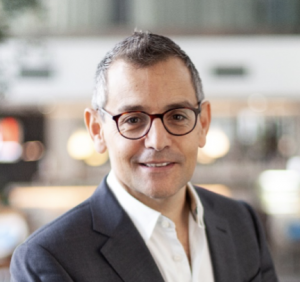EC English’s Andrew Mangion tells Melanie Butler the secret of his optimism
“When the dust settles,” says Andrew Mangion, founder and CEO of the EC chain of language travel schools, “I am optimistic about the outlook for the language travel industry. When the dust really settles,” he adds, “so maybe the end of 2022, early 2023, the market will come back.”
He already has some irons in the fire. His latest brainchild is courses for children delivered not online, but in virtual reality (VR). “It is so immersive. Of course, you are working through an avatar, but you can speak as you do in real life, talk to people in different countries, touch things, explore….”
Perfect, I suggest, for a generation bought up on gaming. EC has already launched a virtual reality summer school for this year. It’s an alternative to the face-to-face summer schools, under the Embassy brand they are also planning to open, travel restrictions permitting. For children facing those restrictions and for those whose parents are too nervous to let them go abroad in the pandemic, a VR summer school may prove the best option.
“It’s not a replacement for the summer school experience,” Andrew admits, adding, “but it’s a good option and these kinds of courses are not just designed for summer.”
“He remains optimistic for the future of adult language travel”
I agree that they would seem a good alternative to normal online teaching, even, perhaps, an alternative to the local language school around the corner. After all, you can create the same kind of multicultural learning experience that language travel offers and the same ability to practise outside the classroom for every student in every country at the same time every week.
As Andrew has realised, this is a tool which can help expand the role of the junior language travel provider beyond the short-stay market. Could it not also see the role of the local language school chain, so strong in markets like China and Italy, expand into the wider world?
In any event, few in language travel expect the junior market to collapse. It’s the year-round adult school market that most observers worry about, especially in destinations such as the UK and USA, where students don’t have work rights. In these mature markets, the local language schools have seen falling adult enrolment for at least a decade. Further, there is little doubt the pandemic has hit the language travel chains, with UK-reliant midsize chains buckling under the strain.
Even major players like EC have cut-back. Andrew has withdrawn from the market in Australia and New Zealand entirely, cutting five schools, citing government refusal to either ease travel restrictions or offer financial support. EC schools in Miami and Washington, DC, have also been permanently closed, as has one British school in Oxford.
Schools open where demand is high. Like most chains, explains Andrew, EC responded to the advent of the KAS, the large Saudi scholarship scheme, by opening centres where the Saudis placed students. With Saudi demand falling, you hit a problem of oversupply. “It’s a question of right sizing,” says Andrew.
He remains optimistic for the future of adult language travel, though, singling out the UK and the USA as likely to be the next markets to grow.
“In the USA, it is the Biden effect,” he says – though not just because the new administration is more welcoming. “The vaccine roll-out has been very fast and effective.”
The same, he points out, can be said of the UK. It’s true too, though he doesn’t say so, of his home country, Malta, where the first EC school opened in 1991.
What makes Andrew so sure that the adult market will recover?
“Demography,” he says. “The OECD predicts the global middle class will grow by another 1.4 billion people in the next decade and few of them will have had access to good English language learning.”
Later I check the statistics and notice that 43% of the new middle class will emerge in just two countries, India and China. The former has a huge local ESL capacity and there is little sign of Chinese adults travelling for short courses.
Then I realise Andrew may have already thought of that.
“Before Covid-19, we were looking seriously at the Philippines. It’s very popular with Japanese and Koreans. It’s a short-haul market.”
Not just an optimist then, but an optimist with a plan.

Andrew Mangion is executive chairman, CEO and a major shareholder of the EC Group. He is a director of Chiswick House School and St Martin’s College, two of the leading K-12 schools in Malta, and served on the board of the Federation of English Language Teaching Organisations in Malta (FELTOM) and was a member of the board of the Association of Language Travel Organisations (ALTO) between 2010 and 2015. He championed the startup of the first YPO Chapter in Malta and was chapter chair between 2005 and 2008. He also served as a member of the YPO European Board.





